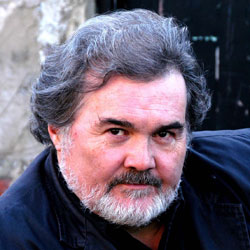We change the river’s name to make it ours.
We wall the city off and call it fate.
We husband our estate of ash,
For what we have we hold, and this
Is what is meant by history.
We have no love for one another, only uses
We can make of the defeated.
– And meanwhile you have disappeared
Like smoke across a frozen field.
What language? You had no language.
Stirring bone soup with a bone, we sip
From the cup of the skull. This is culture.
All we want to do is live forever,
To which end we make you bow down to our gods
In the midday square’s Apollonian light
Before we ship you to the furnaces
And sow you in the fields like salt.
We fear that the fields of blue air at the world’s end
Will be the only court we face.
We fear that when we reach the gate alone
There will be neither words nor deeds
To answer with. Therefore, we say, let us
Speak not of murder but of sacrifice,
And out of sacrifice make duty,
And out of duty love,
Whose name, in our language, means death.
Notes on the Poem
Sean O'Brien opens this poem in a direct, pointed and take charge fashion. Whoever "we" are (well, whoever "The Citizens" are - do they feel like us?) ... they are determined, overwhelming and unstoppable. "We change the river’s name to make it ours. We wall the city off and call it fate." What follows next as "we" sweep through history is powerful in its all-encompassing relevance to many historical milestones and circumstances. For example: "We have no love for one another, only uses We can make of the defeated." can, sadly, be applied to many types of battles, conflicts and vanquishments, as can: "Stirring bone soup with a bone, we sip From the cup of the skull. This is culture." At the same time, the poem can be piercing in its precision at capturing specific circumstances, such as: "Before we ship you to the furnaces And sow you in the fields like salt." Somewhat jarringly but still poignantly, there is something strikingly personal and intimate about ... "- And meanwhile you have disappeared Like smoke across a frozen field." reminding us that individual separations, tragedies and disappearances not only occur in the midst of mass strife, but can mean more to us than those larger forces and disasters. The "we" marching through this poem does indeed become singular towards the end of the poem, reflected in not just the fear but guilt of this: "We fear that when we reach the gate alone There will be neither words nor deeds To answer with." Do the concluding lines of the poem still sound unrepentant, though? Is the "we" who would feel this way someone other than us?
